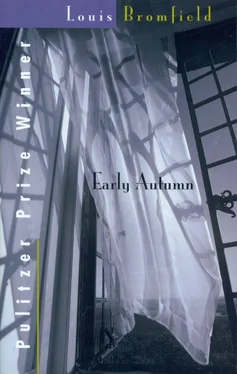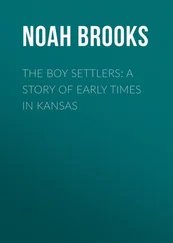It was as if a light of blinding clarity had been turned upon all the long procession of ancestors. She saw now that if “The Pentland Family and the Massachusetts Bay Colony” was to have any value at all as truth it must be rewritten in the light of the struggle between the forces glorified by that drunken scamp Toby Cane and this other terrible force which seemed to be all about her everywhere, pressing even herself slowly into its own mold. It was an old struggle between those who chose to find their pleasure in this world and those who looked for the vague promise of a glorified future existence.
She could see Anson writing in his book, “In the present generation (192–) there exists Cassandra Pentland Struthers (Mrs. Edward Cane Struthers), a widow who has distinguished herself by her devotion to the Episcopal Church and to charity and good works. She resides in winter in Boston and in summer at her country house near Durham on the land claimed from the wilderness by the first Pentland, distinguished founder of the American family.”
Yes, Anson would write just those words in his book. He would describe thus the old woman who sat downstairs hoping all the while that Olivia would descend bearing the news of some new tragedy … that virginal old woman who had ruined the whole life of her husband and kept poor half-witted Miss Peavey a prisoner for nearly thirty years.
The murmur of voices died away presently and Olivia, looking out of the window, saw that it was Aunt Cassie who had won this time. She was standing in the garden looking down the drive with that malignant expression which sometimes appeared on her face in moments when she thought herself alone. Far down the shadow-speckled drive, the figure of Sabine moved indolently away in the direction of Brook Cottage. Sabine, too, belonged in a way to the family; she had grown up enveloped in the powerful tradition which made Pentlands of people who were not Pentlands at all. Perhaps (thought Olivia) the key to Sabine’s restless, unhappy existence also lay in the same dark struggle. Perhaps if one could penetrate deeply enough in the long family history one would find there the reasons for Sabine’s hatred of this Durham world and the reasons why she had returned to a people she disliked with all the bitter, almost fanatic passion of her nature. There was in Sabine an element of cold cruelty.
At the sight of Olivia coming down the steps into the garden, Aunt Cassie turned and moved forward quickly with a look of expectancy, asking, “And how is the poor thing?”
And at Olivia’s answer, “She’s quiet now … sleeping. It’s all passed,” the look changed to one of disappointment.
She said, with an abysmal sigh, “Ah, she will go on forever. She’ll be alive long after I’ve gone to join dear Mr. Struthers.”
“Invalids are like that,” replied Olivia, by way of saying something. “They take such care of themselves.” And almost at once, she thought, “Here I am playing the family game, pretending that she’s not mad but only an invalid.”
She had no feeling of resentment against the busy old woman; indeed it seemed to her at times that she had almost an affection for Aunt Cassie—the sort of affection one has for an animal or a bit of furniture which has been about almost as long as one can remember. And at the moment the figure of Aunt Cassie, the distant sight of Sabine, the bright garden full of flowers … all these things seemed to her melodramatic and unreal, for she was still living in the Pentlands of Savina and Toby Cane. It was impossible to fix her attention on Aunt Cassie and her flutterings.
The old lady was saying, “You all seem to have grown very fond of this man O’Hara.”
(What was she driving at now?) Aloud, Olivia said, “Why not? He’s agreeable, intelligent … even distinguished in his way.”
“Yes,” said Aunt Cassie. “I’ve been discussing him with Sabine, and I’ve come to the conclusion that I may have been wrong about him. She thinks him a clever man with a great future.” There was a pause and she added with an air of making a casual observation, “But what about his past? I mean where does he come from?”
“I know all about it. He’s been telling me. That’s why I was late this morning.”
For a time Aunt Cassie was silent, as if weighing some deep problem. At last she said, “I was wondering about seeing too much of him. He has a bad reputation with women. … At least, so I’m told.”
Olivia laughed. “After all, Aunt Cassie, I’m a grown woman. I can look out for myself.”
“Yes. … I know.” She turned with a disarming smile of Christian sweetness. “I don’t want you to think that I’m interfering, Olivia. It’s the last thing I’d think of doing. But I was considering your own good. It’s harmless enough, I’m sure. No one would ever think otherwise, knowing you, my dear. But it’s what people will say. There was a scandal I believe about eight years ago … a road-house scandal!” She said this with an air of great suffering, as if the words “road-house scandal” seared her lips.
“I suppose so. Most men … politicians, I mean … have scandals connected with their names. It’s part of the business, Aunt Cassie.”
And she kept thinking with amazement of the industry of the old lady—that she should have taken the trouble of going far back into O’Hara’s past to find some definite thing against him. She did not doubt the ultimate truth of Aunt Cassie’s insinuation. Aunt Cassie did not lie deliberately; there was always a grain of truth in her implications, though sometimes the poor grain lay buried so deeply beneath exaggerations that it was almost impossible to discover it. And a thing like that might easily be true about O’Hara. With a man like him you couldn’t expect women to play the role they played with a man like Anson.
“It’s only on account of what people will say,” repeated Aunt Cassie.
“I’ve almost come to the conclusion that what people say doesn’t really matter any longer. …”
Aunt Cassie began suddenly to pick a bouquet from the border beside her. “Oh, it’s not you I’m worrying about, Olivia dear. But we have to consider others sometimes. … Thérèse, Sybil and Anson, and even the very name of Pentland. There’s never been any such suspicion attached to it … ever.”
It was incredible (thought Olivia) that anyone would make such a statement, incredible anywhere else in the world. She wanted to ask, “What about your brother and old Mrs. Soames?” And in view of those letters that lay locked in her dressing table. …
At that moment lunch was announced by Peters’ appearance in the doorway. Olivia turned to Aunt Cassie, “You’re staying, of course.”
“No, I must go. You weren’t expecting me.”
So Olivia began the ancient game, played for so many years, of pressing Aunt Cassie to stay to lunch.
“It makes no difference,” she said, “only another plate.” And so on through a whole list of arguments that she had memorized long ago. And at last Aunt Cassie, with the air of having been pressed beyond her endurance, yielded, and to Peters, who had also played the game for years, Olivia said, “Lay another place for Mrs. Struthers.”
She had meant to stay all along. Lunching out saved both money and trouble, for Miss Peavey ate no more than a bird, at least not openly; and, besides, there were things she must find out at Pentlands, and other things which she must plan. In truth, wild horses could not have dragged her away.
As they entered the house, Aunt Cassie, carrying the bouquet she had plucked, said casually, “I met the Mannering boy on the road this morning and told him to come in tonight. I thought you wouldn’t mind. He’s very fond of Sybil, you know.”
Читать дальше












